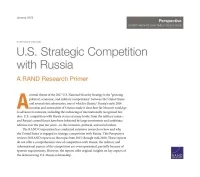 The longstanding U.S. commitment to democracy and liberal values is perceived by Russia as, at best, a threat to regional stability and, at worst, an existential threat to the Russian regime;
The longstanding U.S. commitment to democracy and liberal values is perceived by Russia as, at best, a threat to regional stability and, at worst, an existential threat to the Russian regime;
this represents another point of irreconcilability between the two countries, says a new RAND analysis.
Russia’s desire to influence its neighbors’ political orientation and to keep them within its so-called sphere of influence has deep historical roots, Stephanie Pezard writes in U.S. Strategic Competition with Russia: A RAND Research Primer. This desire can conflict both with U.S. support for liberal democracy and with the U.S.-endorsed notion that sovereign countries have the right to pursue membership in the institutions of their choice—including Western institutions, such as NATO and the European Union (EU).
Overall, Russia “seeks to protect the security of the regime, its influence within its region, and its influence as a great power,” RAND researchers suggest. Competition with the United States arises because Russia “sees U.S. leadership, and its continuing effort to expand liberal democracy, as a threat to these goals.”
Accommodation with Russia on this issue appears particularly unlikely, Pezard concludes. RTWT







